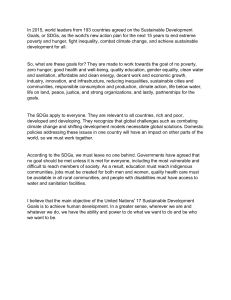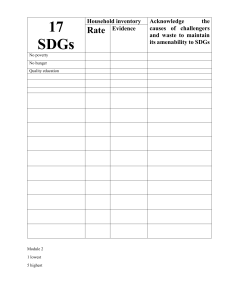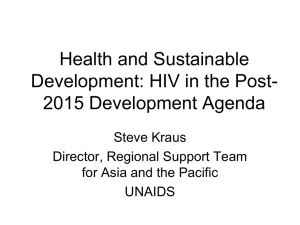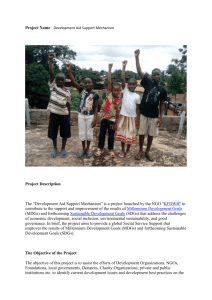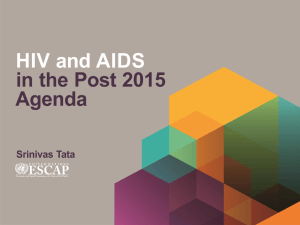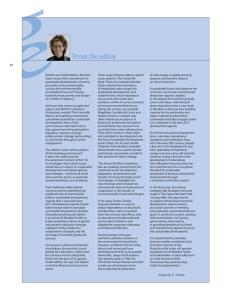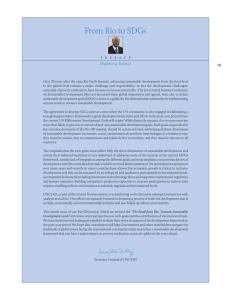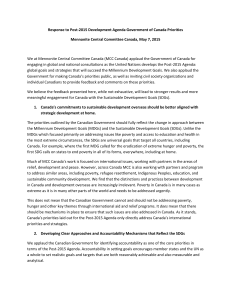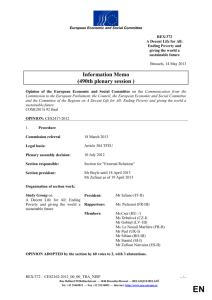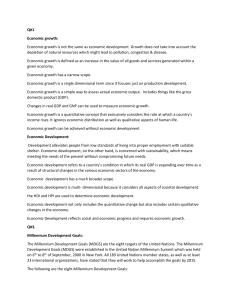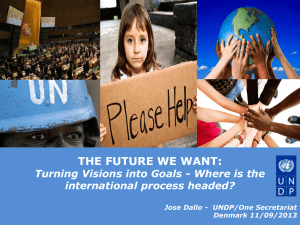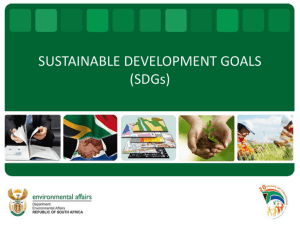Kilaparti Ramakrishna
advertisement
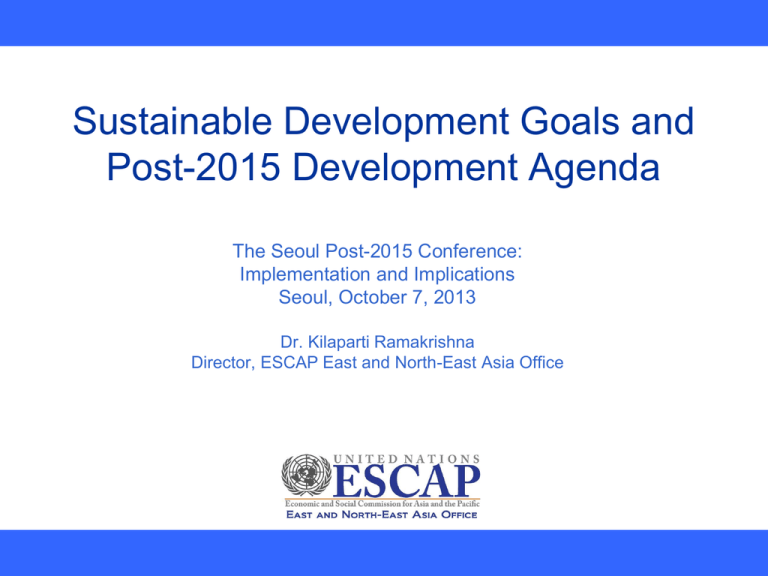
Sustainable Development Goals and Post-2015 Development Agenda The Seoul Post-2015 Conference: Implementation and Implications Seoul, October 7, 2013 Dr. Kilaparti Ramakrishna Director, ESCAP East and North-East Asia Office UNSG at the start of 68th Session of UNGA MDGs have captured the imagination, generated remarkable gains and beat back doubts about development itself. Yet on some goals, we lag badly. Inequality is growing. Too many people face exploitation – from fields to factory floor. 2015 is the year by which we have pledged to achieve the Millennium Development Goals. It is the year in which we will adopt a new development agenda. A new development agenda must be as inspiring as the MDGs, while going further. It must be universal, with ending poverty as its top priority, sustainable development at its core, and governance as its glue. It must find expression in a single set of goals. And there should be no hierarchy among the three dimensions of sustainable development – no deferring the environment or social justice for later, once economic growth is assured. Change is inevitable, but progress is not. Leadership makes the difference. Road towards Rio+20 1972: UNCHE-Stockholm declaration 1970s: Polluter Pays Principle, Precautionary Approach 1987: SD - Our Common Future (by WCED) 19080s: Vienna Convention and Montreal Protocol, IPCC 1992: UNCED – Rio Declaration and Agenda 21, UNFCCC, CBD, UNCCD 1990s: WBCSD, Corporate environment reports 2000: Millennium Declaration and MDGs 2002: WSSD – Johannesburg Plan of Implementation 2000s: CSR, Corporate sustainability report 2012: UNCSD – The Future We Want: green economy, IFSD and SDG Rio+20 Outcome: Key Elements • Renewing political commitment • Green economy in the context of sustainable development and poverty eradication • Institutional framework for sustainable development • Framework for action and follow-up: Thematic /cross-sectoral issues; Sustainable development goals • Means of implementation: finance, technology, capacity building and trade SG Report: A Life of Dignity for All Towards a new sustainable development agenda • universal in nature yet responsive to the complexities, needs and capacities of individual countries and regions • combining the economic, social and environmental dimensions while putting the highest priority on ending poverty and reducing inequality • rights-based, with particular emphasis on women, young people and marginalized groups • eager for new and innovative partnerships; and supported by pioneering approaches to data and rigorous accountability mechanisms. (From - A life of dignity for all: accelerating progress towards the Millennium Development Goals and advancing the United Nations development agenda beyond 2015: Report of the Secretary-General) 5 Proposed SDGs High Level Panel on Post-2015 Agenda Sustainable Development Solutions Network Goal 1: End Poverty Goal 2: Empower Girls and Women and Achieve Gender Equality Goal 3: Provide Quality Education and Lifelong Learning Goal 4: Ensure Healthy Lives Goal 5: Ensure Food Security and Good Nutrition Goal 6: Achieve Universal Access to Water and Sanitation Goal 7: Secure Sustainable Energy Goal 8: Create Jobs, Sustainable Livelihoods, and Equitable Growth Goal 9: Manage Natural Resource Assets Sustainably Goal 10: Ensure Good Governance and Effective Institutions Goal 11: Ensure Stable and Peaceful Societies Goal 12: Create a Global Enabling Environment and Catalyze Long-Term Finance Goal 1: End Extreme Poverty including Hunger Goal 2: Achieve Development within Planetary Boundaries Goal 3: Ensure Effective Learning for All Children and Youth for Life and Livelihood Goal 4: Achieve Gender Equality, Social Inclusion, and Human Rights for All Goal 5: Achieve Health and Wellbeing at All Ages Goal 6: Improve Agriculture Systems and Raise Rural Prosperity Goal 7: Empower Inclusive, Productive, and Resilient Cities Goal 8: Curb Human-Induced Climate Change and Ensure Sustainable Energy Goal 9: Secure Ecosystem Services and Biodiversity, and Ensure Good Management of Water and Other Natural Resources Goal 10: Transform Governance for Sustainable Development 6 Emerging Consensus on SDGs • Limited in number, universal, implementable, measurable, integrate all three pillars of sustainable development • Bridge the gap between MDG implementation and sustainable development agenda • Means of Implementation Concluding Remarks • GEO5, GSP, UNTT, HLP, SDSN and many others advanced their recommendations. • The development of SDGs represents a new critical phase - ‘a culmination and convergence of agendas’ UNEP • OWG is hard at work in the United Nations, 69th session of UNGA is critical in considering and adopting SDGs • How to overcome institutional, technological, financial and capacity development barriers in implementation of SDGs • Voices from the Field by definition contain diverse views but the most important element in all of them is like the UNSG said “Change is inevitable but Progress is not” Concluding Remarks Impacts of Climate Change cannot be underestimated Unsustainable consumption patterns, as well as resource management must be addressed Concrete steps to be taken Integrate the three dimensions of SD and draw from their synergies Revise, adjust and modify SD indicators 9 Thank you! Kilaparti Ramakrishna Director, UN ESCAP-ENEA ramakrishna@un.org
